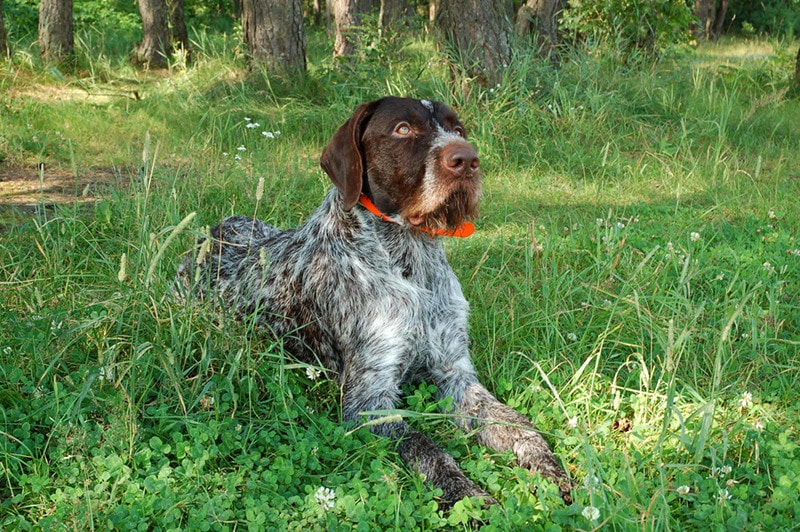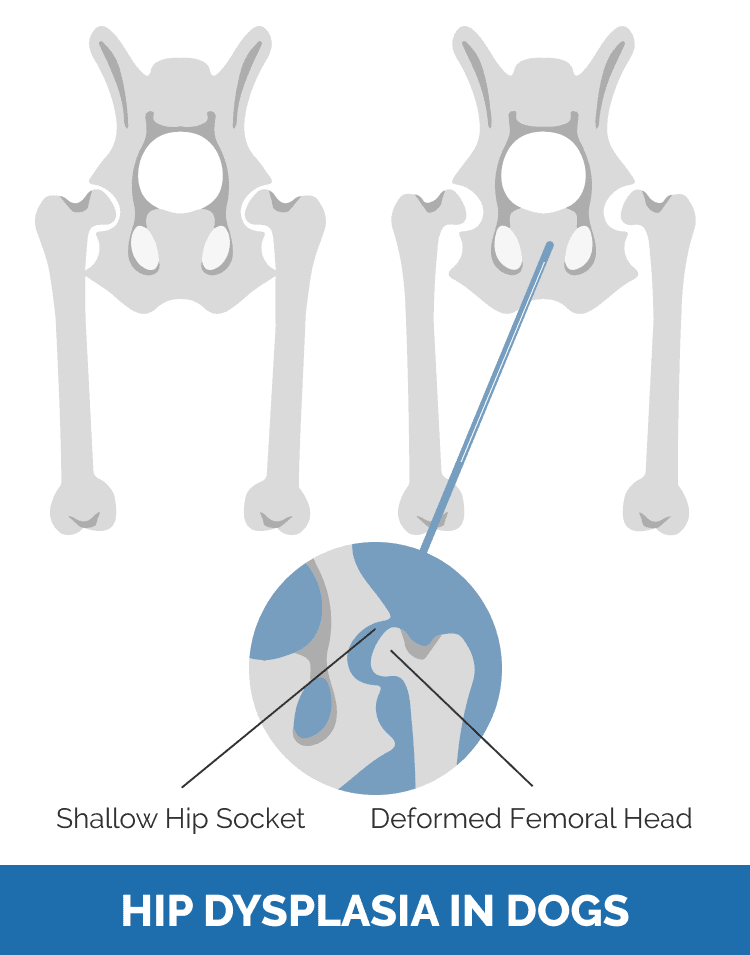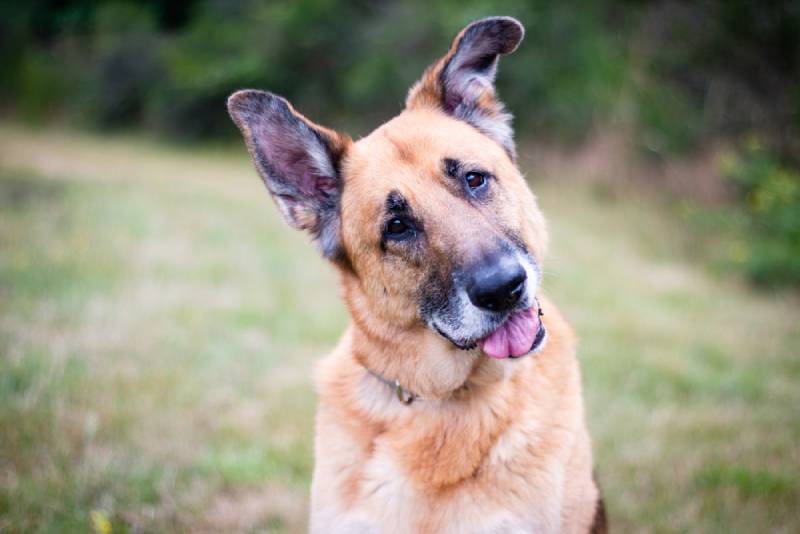10 German Wirehaired Pointer Health Issues: What You Should Watch For
By Hanh Duong
Updated on

The German Wirehaired Pointer is a sporting dog breed from Germany that is medium-large in size. They have a wiry coat of medium length which sets them apart from their close relative, the German Shorthaired Pointer.
Although these canines are generally healthy, there are still certain health conditions that can cause concern, particularly if you don’t purchase from a reputable breeder. By familiarizing ourselves with health issues specific to German Wirehaired Pointers, we can create a preventive health strategy to monitor and avoid some more predictable risks.
The 10 German Wirehaired Pointer Health Issues
1. Obesity
German Wirehaired Pointers can suffer from obesity, leading to various health issues such as joint problems, back pain, heart disease, and metabolic and digestive disorders. Giving your furry friend human food or dog treats may be tempting, but this can be detrimental to their health. Instead, incorporate regular daily activities like playing a game or taking them for a walk into your routine.
Not only will this benefit their health, but it will also strengthen your bond with them. Show your furry friend love in a healthier way!
2. Dental Disease
Did you know that dental disease is a common problem in pets? Unfortunately, German Wirehaired Pointers are more susceptible to experiencing dental problems compared to other dog breeds. The issue typically begins with tartar buildup on their teeth, which can then lead to infections in their gums and roots. If left untreated, your furry companion may lose teeth and be at risk of health issues.
In fact, dental disease can shorten your German Wirehaired Pointer’s lifespan by 1–3 years. To help prevent this, schedule regular teeth cleanings.

3. Infections
All canines, including the beloved German Wirehaired Pointers, have the potential to contract bacterial and viral infections like rabies, parvo, and distemper. However, vaccination can prevent many of these infections. Considering several factors, such as the pet’s age and the prevalent diseases in the region, your vet can provide the appropriate vaccination recommendations that will help safeguard your furry friend against these infections.
4. Heart Disease
German Wirehaired Pointers may experience sick sinus syndrome, which is a condition that can cause a slow heart rate and fainting during exercise due to a malfunction of the sinus node responsible for initiating heartbeats in the electrical system. While medication can help with mild cases, advanced care may be necessary for more severe symptoms.
Additionally, some German Wirehaired Pointers may develop a heart condition called aortic stenosis. This condition can cause a partial blockage of blood flow from the heart, making it more difficult for the heart to pump enough blood. If the condition is severe, your dog may experience fainting or exhaustion during exercise, breathing difficulties, coughing, or not grow as expected. It’s essential to monitor your dog’s health and talk to your veterinarian if you notice any concerning symptoms.

5. Bloat
If your furry friend has a deep, narrow chest, they may be susceptible to a severe medical condition called Gastric Dilatation and Volvulus (GDV) or Bloat. This condition occurs when the stomach twists on itself and fills with gas, causing a lack of blood supply to the stomach and spleen. Some common symptoms of GDV include retching, restlessness, an enlarged abdomen, or the dog lying in a prayer position (front feet down, rear end up).
If you observe any symptoms, you must take your pet to the nearest emergency pet hospital immediately.
6. Hip and Elbow Dysplasia
Your German Wirehaired Pointer is susceptible to dysplasia, a genetic condition affecting their hips and elbows. This condition causes the joints to develop abnormally, leading to arthritis. As your dog ages, they may experience stiffness in their hips or elbows, resulting in lameness or difficulty standing up from a lying position.
Be aware that overweight dogs have a higher risk of developing arthritis at a much earlier age, which can cause unnecessary discomfort.

7. Bleeding Disorders
Dogs can inherit various types of bleeding disorders, varying in severity from mild to severe. Sometimes, a pet may appear healthy until they experience a significant injury or undergo surgery, leading to severe bleeding. One such disorder is Von Willebrand’s disease, a blood clotting disorder commonly found in German Wirehaired Pointers.
8. Joint Disease
If German Wirehaired Pointer puppies grow too fast, their joint cartilage may not attach to the bone correctly, leading to Osteochondritis Dissecans (OCD). In such cases, surgery may be necessary. It’s essential to be mindful of weight gain to ensure the healthy growth of German Wirehaired Pointer puppies. Keep their growth rate to no more than 4 pounds per week, avoid overfeeding or providing extra calcium supplements, and opt for a large-breed puppy diet.
To track their progress, weighing your puppy every 3–4 weeks is advisable.

9. Allergies
If humans have mold, pollen, or dust allergies, we often experience sneezing and itchy eyes. However, in dogs, allergies can lead to a condition known as “atopy,” which causes itchy skin. German Wirehaired Pointers are particularly susceptible to this type of skin allergy, typically affecting their feet, skin folds, belly, and ears. Symptoms generally arise between 1 and 3 years old and can worsen.
Some common signs of this condition in dogs include regular ear infections, facial rubbing, and paw licking. Fortunately, there are many treatment options available to help alleviate these symptoms.
10. Thyroid Problems
If you own a German Wirehaired Pointer, it’s essential to keep an eye out for a prevalent condition they may develop called hypothyroidism. This occurs when their body doesn’t produce enough thyroid hormone and can result in symptoms such as dry skin and coat, weight gain, fearfulness, hair loss, increased susceptibility to skin diseases, aggression, and behavioral changes. We suggest scheduling an annual blood screening test to monitor this condition.
Fortunately, treatment is often straightforward and involves taking replacement hormones in pill form.
Conclusion
German Wirehaired Pointers are lovely pets with high energy levels and a strong desire to please their owners. Their loyalty and affectionate nature make them a joy to be around. At the same time, their hunting dog lineage has endowed them with endurance and versatility, making them the perfect outdoor companion for those who love nature.
It’s essential to note that just like their human counterparts, purebred dogs can inherit genetic health problems. Therefore, buying from a breeder who offers a health guarantee on their puppies and is transparent about any health issues in their breed is crucial. Honesty is key when it comes to finding the perfect furry friend.
Featured Image Credit: eAlisa, Shutterstock











